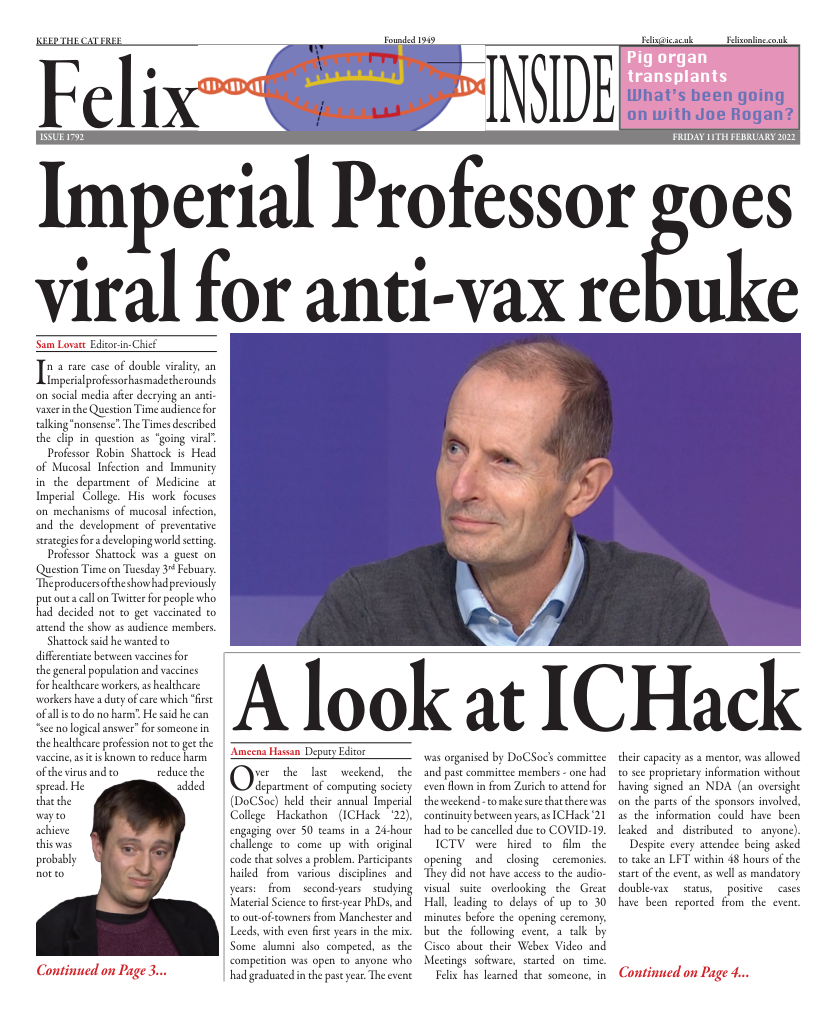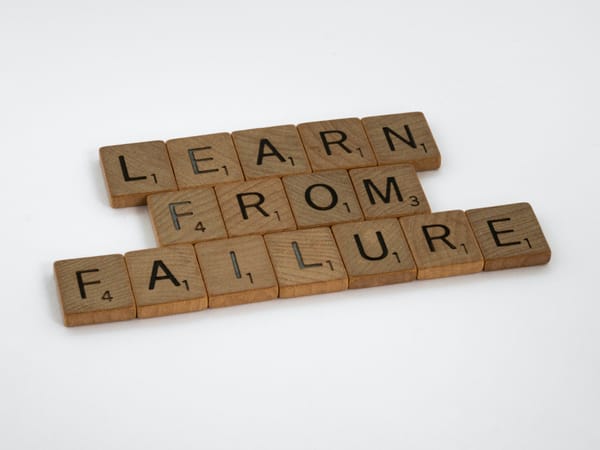Anti-relationship not anti-love
Women have long been pressured to find their value in marriage and motherhood, but this puts young women at risk of committing to relationships that do not fulfil their wants and needs in the short and long-term.

The Emotional Context
If I am being honest with myself, I became anti-relationship after a series of failed relationships and situationships - as do most people after having gone through a breakup. In the spirit of a true Imperial student, I turned to books about relationships (I should note mainly books written by feminists), wanting them to convince me further that relationships would not benefit me, and even go as far as to hinder me. It worked. So now I am not only anti-relationship due to heartbreak, but I also have real ammunition behind my personal belief which I have attempted to articulate in this article.
The Nuclear Family and Having a Career
After reading ‘Why I’m not a Feminist’ by Jessa Crispin, I felt so enraged that women were almost condemned to this life of being born, educated, told to get a job, then expected to give all that up to dedicate their lives to raising a family. Just because we have ovaries. I refused to believe that this would be the series of events that describe my life because, as a woman, I am ‘innately more maternal’. I would like to quickly mention that I do not see the issue with wanting that life for yourself as a woman. It goes without saying that being a mother is commendable. But what I did not like was the fact that this was a ‘given’ in society. It is the expectation of whatever man that I may one day meet that he will not give up his career to raise my children. Because why would he? He is told that it is in his biology to be the strong, responsible provider in our nuclear family.
I like the idea of the house-husband. Women can be the providers, particularly as technology has developed i.e., the contraceptive pill allowing women to postpone having children in order to prioritise their careers. But should the liberation of the working woman be at the expense of her husband who has worked equally hard to get his dream career? Not if he doesn’t want to. I cannot understand why anyone, regardless of gender, would willingly sacrifice all they had worked for to have a family. Why must anyone compromise? The formation of nuclear families, based on the argument of human biology, has historically benefitted men, but even with these developments it is still oppressive to the parent who must undergo the sacrifice.
The next argument is that you can have both. This is the solution concocted to prevent the dissolution of the nuclear family which is the basis for the whole of society. Too much change would be scary so we need to tell the girls something that will stop them from thinking too hard about it. That’s it. We will tell them they can be a CEO and then go home to their mansions to their gorgeous, rich husband and kiss their straight A* children goodnight. Maybe this is possible. With money and with help i.e., a nanny for your baby or a private tutor to help your child with their homework. Can the average working woman afford this level of extra care needed for her to have both? In 2021 the average salary for a woman was £28,305 in the UK, according to the Office for National Statistics. So, let us say that the average successful woman is on a salary of about 20% more than that, so £33,600. Full time nursery care in the UK averages at about £14,000 which is 41.7% of her salary. This is not taking into account the quality of the care. Would this be providing the best quality of life for your child? Even if it was, what about emotional care? Is it ethical to have someone else raise your child?
Finally, what about having children in later life? Maybe you are lucky enough to see an early retirement on the horizon. Or you have an established career, and you feel like now is the time to step back. My argument here is that delaying reproduction is detrimental to the offspring. The best-known example to support this argument is the prevalence of Down’s Syndrome. At 25, the rate of an embryo having Down syndrome at week 10 of pregnancy is 0.09%. At 35, this rises to 0.42% and by 45, the Down syndrome rate increases to 5.3%. It begs the question: commitment to success or commitment to survival? It is my belief that you cannot have both and do both well.

Children and the Environment
It is almost trendy now to care about the environment. Buying from charity shops is ‘cool’ and God forbid you buy from Pretty Little Thing. Look how fast Molly Mae gets attacked after benefitting from the capitalist structure which is slowly murdering the planet. These same keyboard warriors that will turn their noses up at you for not going vegan or for shopping at Zara (mostly) do not realise how hypocritical they are. Morgan Stanley analysts believe that having a child is 7-times worse for the climate in annual CO2 emissions than the next 10 mitigants at the individual level. Overpopulation comes with overconsumption; according to one 2017 study one child equates to about 58.6 tonnes of carbon each year in the developed world. We do not consider how our relationships may be impacting the environment when we shame someone for not recycling.
The Biology of Monogamy
Jessa Crispin had convinced me that I do not want to sacrifice a career for a family. The next logical step for me was to challenge my perception of romantic relationships. So, I read ‘Untrue’ by Wednesday Martin for an insight into the alternatives to monogamy.
All of my family are monogamous. I had grown up thinking this is what happens because it works in the best way. However, Martin hinted to me that this might not be the case.

Generally, it is accepted that women are the more monogamous gender. Men can ‘spread their seed’ and impregnate multiple women at one time whereas women can only fall pregnant by one man at a time. By natural selection, we want the best offspring and so women should be more judicious in their choice of men to better their chances here. Stephen Fry even went as far as to claim that women do not even enjoy sex. He believes they see it as ‘the price to pay for a relationship’.
‘Untrue’ unveils the truth that this assumption is a lie. Between 2018 and 2019, women were found to cheat 40% more in monogamous relationships than in previous years. A study by Meana concluded that familiarity of spouse decreases the female libido as opposed to males who were likely to report sexual satisfaction from sex with a long-term partner.
I encourage you to pick up the book for more extensive statistics, but I had concluded that women are not necessarily the monogamous beings that I had grown up thinking. Women cheat just as much as men. Women like sex as much as men. But why are we so committed to the idea of a happy ending in a monogamous relationship, if we are going to be disloyal? As a 20-year-old, it is impossible for me to imagine how it feels to be tethered to one other human being for 60 years. I have known my parents for 20 years and that is my longest standing relationship to a human. One can imagine that after 60 years, you may get bored or look outside of your romantic relationship for stimulation, may that be intellectual or sexual. This is where polyamory offers a solution. We have infinite love for multiple friends, parents have infinite love for multiple children. Why do we limit ourselves to just one romantic partner? Polyamory offers a logical solution, yet it is not quite accepted as ‘normal’ by society.
Love is Not the Problem
I am not anti-love. Love is amazing and I love many people in my life. The problem is the weighting that romantic love has in the decision-making process that young women undertake when crafting the paths that will be their future.
You just have to open TikTok or Instagram to see pictures of happy couples with millions of likes. Society values monogamy, not love. It seems that if you are in a relationship, then you must be desirable and therefore you are higher up the food chain. We envy people in happy relationships, but we do not envy ourselves despite having other forms of love in our lives.
On the other side of the coin, there are the female influencers living their ‘hot-girl summer’. We love to see empowered, single women and we celebrate them as feminists. But do we seek personal improvement in order to make ourselves more attractive on the romantic market? It is a pessimistic view, but a valid one.
I worry that we place so much emphasis on the importance of romantic relationships that we lose sight of things that matter more.
This is my opinion, but I hope it made you uncomfortable. I hope somewhere, you felt angry that you slightly agreed with me. We are convinced from a young age that this is what we need to do. Enter a monogamous relationship and have a family. Do not think about it too much because you will be unhappy. Well, I am thinking, and I am unhappy. Thinking about it and challenging the expected allows me to make decisions now, while I am in my 20s, that I hope will result in me living a happier and more fulfilled life. If you disagree, please convince me I am wrong. Because that would definitely be an easier fate to accept. It is the default after all.










